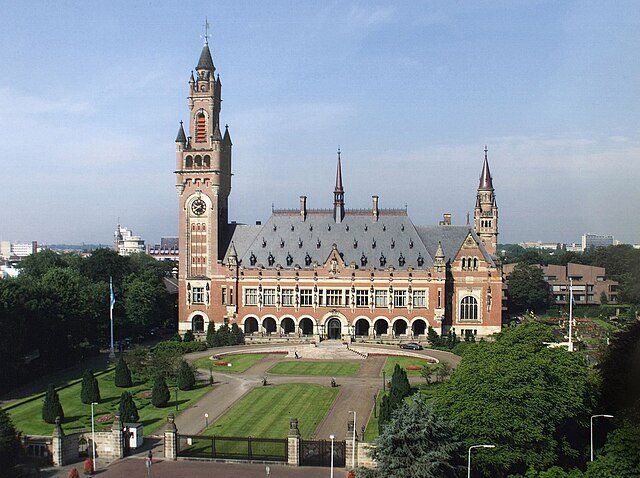On March 5th, 2025, Sudan filed an Application instituting proceedings against the United Arab Emirates (UAE) before the International Court of Justice (ICJ) regarding the alleged violations of obligations under the Genocide Convention (GC) and requested for the indication of provisional measures. Sudan alleged UAE of supporting the Rapid Support Force (RSF) militia in the commission of genocide in West Darfur against the Masalit group. Both Sudan and UAE have acceded to the Genocide Convention (GC).UAE has formulated a reservation with respect to the compromissory clause (Article IX) of the GC and invoked the same against the jurisdiction of the ICJ.
In response, Sudan contended that the reservation to the compromissory clause under the GC is incompatible with the object and purpose of the treaty. On 5th May 2025, the ICJ rejected the provisional measures request and ordered that the case be removed from the General List because of manifest lack of jurisdiction.
At the preliminary stage, the ICJ is required to satisfy prima facie jurisdiction under Article IX of the GC. This evaluation is done in two stages. Firstly, the applicant needs to establish the existence of a dispute. Secondly, the acts complained of by the applicant are capable of falling within the provisions of the GC. However, reservation to Article IX would be an additional barrier in establishing prima facie jurisdiction. I argue that the ICJ has adopted a Statist and formalistic approach in assessing the reservation to Article IX by overlooking the human vulnerability standards.
Human Vulnerability Standards
Alexander H. E. Morawa defines human vulnerability as referring to “segments of the population which are or should be the recipients of extra care and attention.” Judge Cançado Trindade in Ukraine v. Russian Federation, provided the specific contents of human vulnerability, i.e., ‘a) the gravity of the situation b) the urgency of the need for such measures, and c) the probability of irreparable harm.’ These requirements are met for the crime of Genocide. Therefore, when interpreting reservations to Article IX, these elements must be taken into cognisance.
Firstly, the cases in the ICJ on Genocide make references to the contents highlighted by Judge Trindade. In the 1951 Genocide Reservations Case, the ICJ stressed the humanitarian and universalistic features of the GC. The ICJ observed that “…its object, on the one hand, is to safeguard the very existence of certain human groups and on the other to confirm and endorse the most elementary principles of morality.” Moreover, intention of the GC is to punish Genocide as it involves the denial of the right to the existence of human groups, thereby underscoring the language of human vulnerability. Taking this forward in Gambia v. Myanmar, the Court considers the exceptional gravity of the situation in granting provisional measures in relation to the Rohingya group (para 28). In DRC v. Rwanda, the ICJ had an opportunity to evaluate Rwanda’s reservation to Article IX; the Court regarded the reservation as not incompatible with the object and purpose, however, the ICJ underscored that the “principles underlying the [Genocide] Convention are principles which are recognised by civilised nations as binding on States, even without any conventional obligation.”
Secondly, human vulnerability is unique to Genocide, unlike environmental harm or territorial disputes, where it would be difficult to quantify the loss. For instance, it would have been difficult to characterise human vulnerability in Certain Documents and Data or in the Great Belt case unless a certain level of severity is met. The level of severity is high for Genocide. InSouth Africa v. Israel, the ICJ observed, “the civilian population in the Gaza Strip remains extremely vulnerable” (Para 70). Further, the probability of irreparable harm in Ukraine v. Russian Federation was interpreted to mean loss of life and if the risk is particularly vulnerability and the fragility of a particular situation (Para. 69). Accordingly, the Court considered that the civilian population affected by the conflict is vulnerable (para. 75).
Thirdly, human vulnerability aligns with the trends towards humanisation of international law. This is conspicuous in the ICJ interpretations on questions of jus cogens, customary international law, consular access, etc. While referring to Ukraine v. Russia, Tom Sparks and Mark Somos opined -“ the case was notable for the strong statement by Judge Cançado Trindade of an alternative vision of provisional measures, in which he argued that human vulnerability has replaced plausibility as the key factor.” According to Judge Trindade international legal order endorses individuals as the ultimate beneficiary. Prof. Anne Peter, while quoting Judge Trindade, adds that a substitute of plausibility with human vulnerability would ‘lead to a more generous indication of a provisional order.’ Tom Sparks and Mark Somos refer to this shift as humanitarian stasis.
Fourthly, individual Judges in the ICJ have articulated the contents of human vulnerability. The dissenting opinion of Judge M. Alvarez in the Genocide Reservations Case highlighted that reservation to the GC would be contrary to the social interest. In the Legality of Use of Force case Judge Kreca, through his separate opinion, observed- “it should be pointed out that a reservation such as the one made by Spain with respect to Article IX of the Convention on the Prevention and Punishment of the Crime of Genocide surely does not contribute to the implementation of the concept of an organised, de jure, international community.”(Separate Opinion para. 5). Further, Judge Koroma in DRC v. Rwanda believed that GC is not based on reciprocity but instead “serves to protect individuals and the international community at large.” The severity of Genocide is perhaps aptly articulated by ad hoc Judge Barak in South Africa v. Israel, as “ destruction and human behaviour at its very worst. It is the gravest possible accusation…”
Fifthly, human vulnerability standard is actively engaged by the regional human rights bodies and tribunals; for instance, in A. V. United Kingdom, the ECtHR observed in the context of Article 3 of the Convention for the Protection of Human Rights and Fundamental Freedoms,as “Children and other vulnerable individuals, in particular, are entitled to State protection, in the form of effective deterrence, against such serious breaches of personal integrity.” (A v. United Kingdom, Judgment of 23 September 1998, p.2). The Inter-American Court of Human Rights (IACtHR), while addressing the rights of people belonging to vulnerable groups such as persons with disability and children, has provided extra scrutiny. In the words of Clara Burbano-Herrera and Yves Haeck, this is because these groups add vulnerability. While discussing the vulnerability of children with respect to children convicted of serious crimes, the Inter-American Court in Socio-Educational Internment Facility (Brazil) has granted provisional measures to protect all the children imprisoned. As the ICTY Appeals Chamber put it in Prosecutor v. Krstic: “Among the grievous crimes this Tribunal has the duty to punish, the crime of genocide is singled out for special condemnation and opprobrium.”
Sixthly, the object and purpose of the GC are immune to reservations. The ICJ has not provided cogent reasoning for rejecting the object and purpose vis-à-vis Article IX of the GC. The only reasoning provided by the ICJ in DRC v Rwanda (provisional measures) was that Rwanda’s reservation does not have any bearing on the substance of the law (GC), but only on the Court’s jurisdiction. This, however, is contrary to human vulnerability standards, because as the ILC Guide to Practice on Reservations to Treaties (2011) in 3.1.5.1 states, “[T]he object and purpose of the treaty is to be determined in good faith, taking account of the terms of the treaty in their context, in particular the title and the preamble of the treaty. Recourse may also be had to the preparatory work of the treaty and the circumstances of its conclusion and, where appropriate, the subsequent practice of the parties.” The elements identified by the ILC are reflective of the human vulnerability standards. For instance, recital two of the GC preamble reads: “[R]ecognizing that at all periods of history, genocide has inflicted great losses on humanity.” Reservation to Article IX could further aggravate the loss of a specific group by blocking access to justice. Further, the title of GC reflects the idea of Prevention and Punishment of the Crime of Genocide; inUkraine v Russian Federation, the ICJ observed- “Contracting Parties must implement this obligation in good faith, taking into account other parts of the Convention, in particular Articles VIII and IX, as well as its preamble.” (Para. 56).
Statist and Formalistic Approach
The Joint Separate Opinion Of Judges Higgins, Kooijmans, Elaraby, Owada And Simma in DRC v. Rwanda, observed that “It is thus not self-evident that a reservation to Article IX could not be regarded as incompatible with the object and purpose of the Convention and we believe that this is a matter that the Court should revisit for further consideration”. The ICJ was presented with an opportunity to make further consideration in Sudan v. UAE. The case provided an opportunity to clarify the contours of the reservation to Article IX. UAE’s reservation to the GC reads as:
“The Government of the State of the United Arab Emirates, having considered the aforementioned Convention and approved the contents thereof, formally declares its accession to the Convention and makes a reservation with respect to article 9 thereof concerning the submission of disputes arising between the Contracting Parties relating to the interpretation, application or fulfilment of this Convention, to the International Court of Justice, at the request of any of the parties to the dispute.”
Sudan considered the reservation to be vague and non-specific as it omits the phrase, “including those relating to the responsibility of a State for genocide”, which is mentioned under Article IX. Also, Sudan brings into the reckoning the ‘human vulnerability standards’ when it considered the reservation from the standpoint of the object and purpose of the GC. According to Sudan, “through Article IX of the Genocide Convention, the Court “plays a pivotal role” in giving practical effect to the realization of the Convention’s object to “safeguard the very existence of certain human groups”.” However, the ICJ rejected both the contentions by taking a Statist and formalistic approach. Accordingly, the Court’s jurisdiction is only with respect to the consent provided by the State and within the limits set by the jurisdictional clause. Thereby, the ICJ found that reservations under the GC are not prohibited, unless they conflict with the object and purpose of the Convention. Hence, the ICJ believed the reservation is not incompatible with the object and purpose as it does not affect the substantive obligations pertaining to the act of Genocide. In essence, reflecting the observations of the ICJ in DRC v. Rwanda.
The interpretation of the ICJ is deeply flawed, as it sees the GC through the lens of the State rather than human persons. Firstly, the purpose of provisional measures is to protect the rights of the parties from urgent and irreparable harm; instead, the ICJ, as aptly put by Judge Yusuf in his dissent, conflates the prima facie jurisdiction with jurisdiction on the merits. Although the ICJ need not definitely satisfy the jurisdictional requirements at the preliminary stage, it concludes that it, “manifestly lacks jurisdiction to entertain Sudan’s application” (Para 35). This prevented it from examining its jurisdiction on the merits, thereby depriving Sudan of the opportunity to be heard on the dispute. Secondly, the ICJ borrows excessively from DRC v. Rwanda to reject the jurisdiction claim. However, the said opinion was in the context of a preliminary objection after examining the written pleadings. As observed in the Joint Partly Dissenting Opinion of Judges Bhandari, Charlesworth, Gómez Robledo, Cleveland, Tladi and Judge Ad Hoc Simma, “with two hours of oral hearings allocated per party to address all the factors for provisional measures, are not-and should not be-the appropriate stage to conduct a thorough and final determination of such arguments.” Thirdly, with respect to the reservation to Art. IX, as per the travaux préparatoires and State practice, it is the raison d’être of the Convention, thus constituting the Convention’s object and purpose, which the Court did not adequately address.
Conclusion
As an apolitical organ of the United Nations (UN), the ICJ is the sole forum to interpret the GC on a case-by-case basis. Considering the nature of the GC, human vulnerability can be a compelling standard at the preliminary stage. However, the recent ruling of the ICJ only highlights the Court’s infatuation with structural proclivities over human suffering.
—
Author
Atul Alexander is an Assistant Professor of Law at the West Bengal National University of Juridical Sciences (WBNUJS), Kolkata, India.





